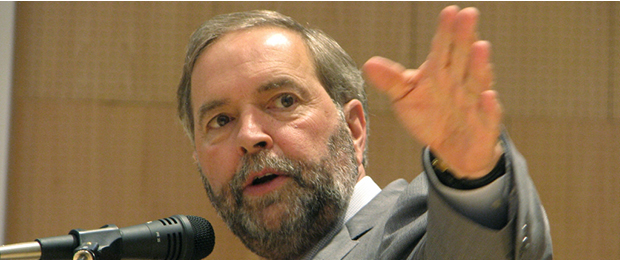
Thomas Mulcair by Laurel L. Russwurm is released under a Creative Commons Attribution 2.0 Licence.
Federal
NDP maintains lead
NDP minority seen
TORONTO July 21st,
2015 - In a random sampling of public opinion taken by the Forum Poll™ among
1208 Canadian voters, more than a third will vote NDP if the next federal
election were held today (34%), while the Liberals (29%) and the Conservatives
(28%) tie for second place. Few will vote Green (4%), Bloc Quebecois (5%) or
for any other party (1%).
These results
represent stability since last week’s poll (July 14, NDP - 34%, Liberals and
Conservatives - 27% each). In Atlantic Canada, the Liberal stronghold, they
lead (46%) and the NDP are second (29%) and the Conservatives third (25%). In
Quebec, the NDP lead (38%) and the Liberals (19%), Conservatives (20%) and Bloc
are tied up behind (20%). In battleground Ontario, The three parties are tied
(Liberals - 33%, NDP and Conservatives - 31% each). The Conservatives dominate
in Alberta (42%) while the NDP is second (32%). In BC, the NDP are dominant
(43%) compared to the Conservatives (27%) and Liberals (23%).
Among those who
think Canada has entered a recession, most will vote NDP (41%), while about
half this proportion will vote for the Conservatives (18%) and just fewer for
the Liberals (31%).
Fully one half
of those who are voting for a different party this time than in 2011 will vote
NDP (49%), while fewer will vote Liberal (31%) and very few will vote
Conservative (11%).
Few pick Conservatives as second choice party
Just
one sixth say they would vote for the Conservatives as their second choice
(15%), while more than this will vote NDP (25%) or Liberal (23%) as their
second choice. Conservatives are most likely to pick the Liberals as their
second choice party (24%) rather than the NDP (21%). Liberals are
overwhelmingly likely to pick the NDP second (54%) and the reverse is the case
for the NDP (47% would vote Liberal second). Thus, the ceiling for the NDP vote
is a total of 6-in-10 votes (59%), while the ceiling for the Liberal vote is
one half (52%). The most votes the Conservatives could win would be 4-in-10 or
so (43%).
NDP minority government if vote held today
If
the election were held today, these results, projected up to a 338 seat house
of commons, would yield an NDP minority government of 134 seats, 36 fewer than
required for a majority. The Conservatives would claim 121 seat, the Liberals
78, the Bloc would seat four members and the Green Party would retain the
leader’s seat.
Leader approvals steady
Stephen
Harper has the approval of 3-in-10 voters (31%), up slightly from last week
(27%) and his net favourable rating continues to be a very negative -31 (-35
last week). Tom Mulcair now enjoys the approval of one half the electorate
(50%) and has a very positive net of +26. Justin Trudeau has the approval of
close to 4-in-10 (38%) and his net score is a neutral -6 (38% and -3 last week).
Conservatives, NDP tied in expectation of victory
About
3-in-10 voters expect either the Conservatives (30%) or the NDP (29%) to win
the next election, followed by the Liberals at one quarter (24%).
Mulcair tops best PM list
Tom
Mulcair is seen to make the best Prime Minister by 3-in-10 (29%), compared to
about one quarter for Stephen Harper (25%) and a fifth for Justin Trudeau
(20%). Close to one fifth of Liberal voters believe Mulcair would make the best
PM (17%).
While jobs and growth leads issue list, ethics and transparency
close behind
When
asked what the most important issue will be in the upcoming election, the
plurality, or one quarter, mention jobs and growth (26%). In second place,
though, is ethics and transparency in government (17%), followed by pipelines
and the environment and keeping taxes low (12% each). It should be noted that,
in this exercise, jobs and growth is always seen as the most important issue,
and the issue identified as next most important is actually key. In this case,
ethics and transparency is an issue which reflects poorly against the incumbent
party. Jobs/growth is a key issue for Conservative voters (34%) while less so
for Liberals (26%) and New Democrats (23%). Key issues among New Democrat
voters are pipelines and the environment (15%), ethics and transparency in
government (22%) and time for a change (20%). For Liberals, time for a change
(24%) and ethics and transparency are key (17%).
4-in-10 will switch vote from 2011
As
many as 4-in-10 voters will support a different party this time than they did
in the 2011 federal election (39%), and this is especially the case among those
who plan to vote NDP this time (54%), as well as among those voting Liberal now
(40%).
"We have entered a period
where the status quo is likely to remain static at least until after the summer
ends. Voters have changed their minds over the summer, and now see Tom Mulcair
as the anti-Harper, rather than Justin Trudeau, who held this position most of
last year. Justin was flavour of the month when he was fresh and unknown. Now
he’s no longer fresh, and is better known, he has lost some of his lustre.
Basically, Tom Mulcair spent his time grinding away in the house, demonstrating
commitment and competence, and it paid off, after almost three years. Voters
now see him as the most competent leader in the country, and are willing to
offer him their vote," said Forum Research President, Dr. Lorne
Bozinoff.
Lorne Bozinoff, Ph.D. is the president and founder of Forum
Research. He can be reached at lbozinoff@forumresearch.com or at (416)
960-9603.
